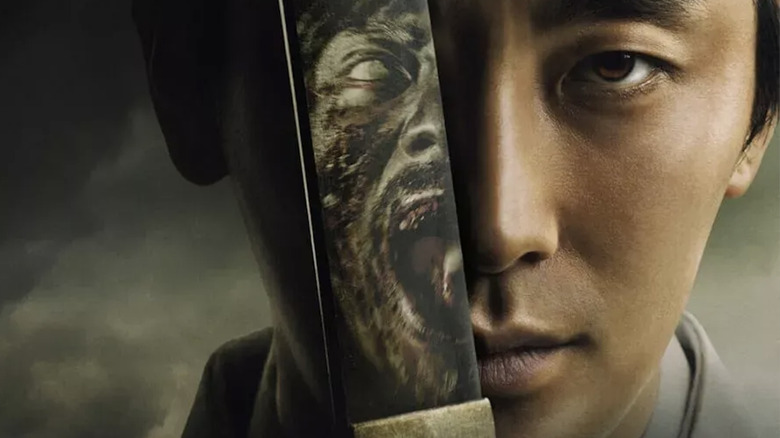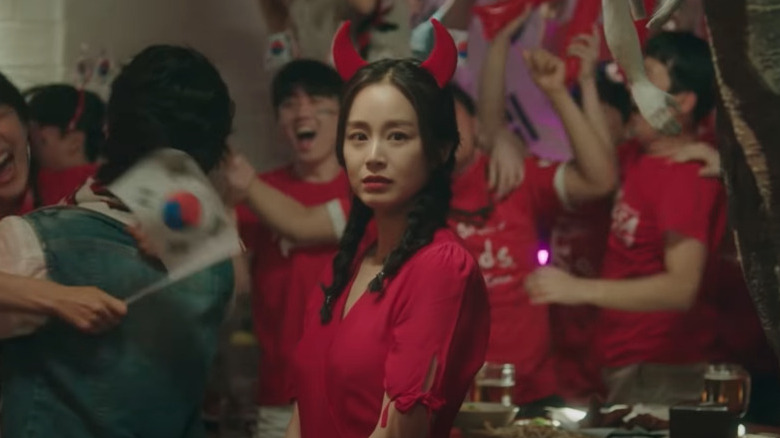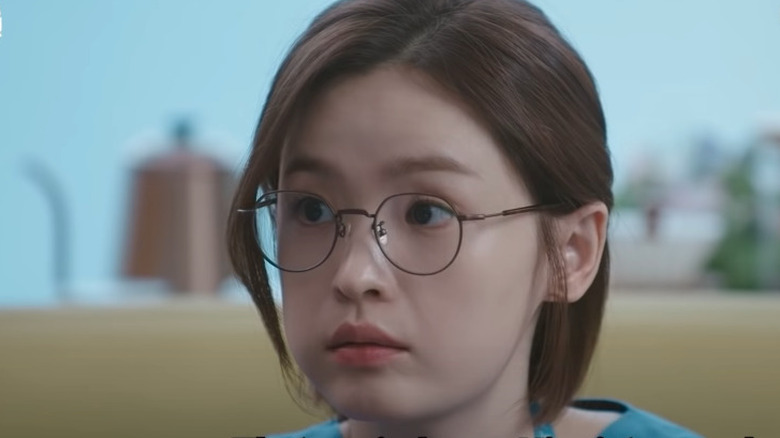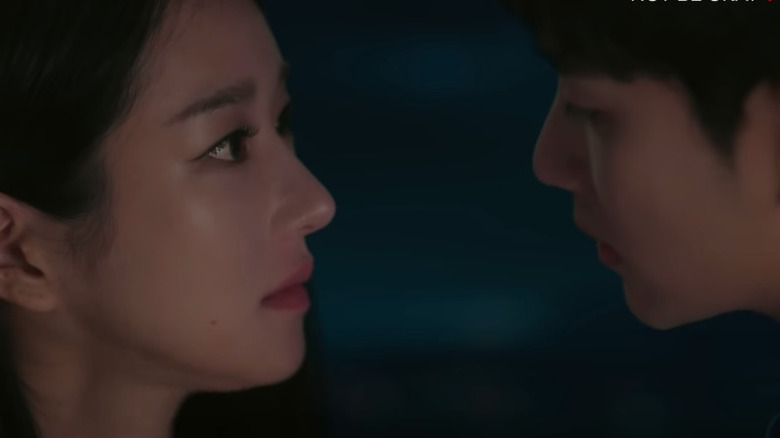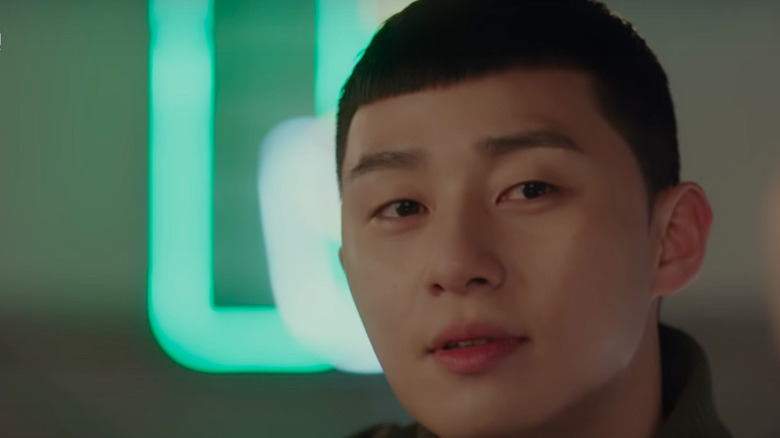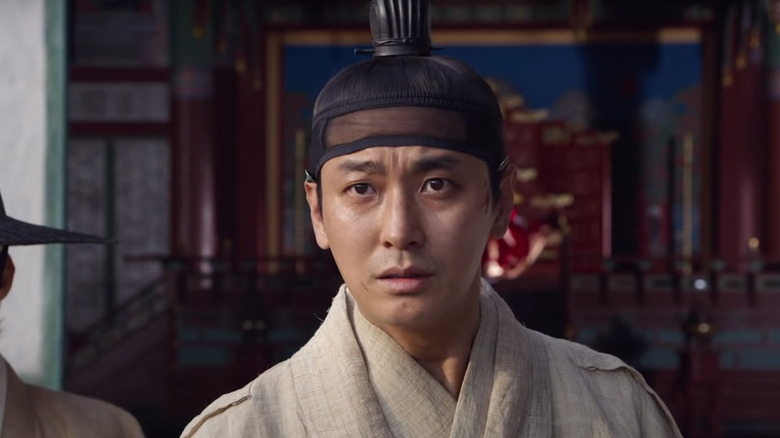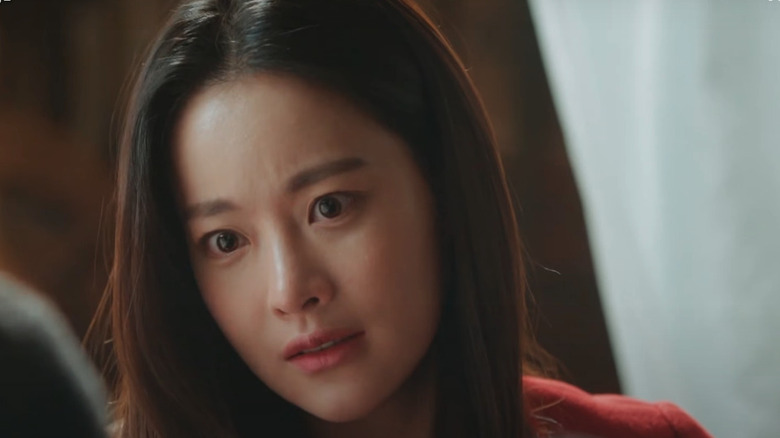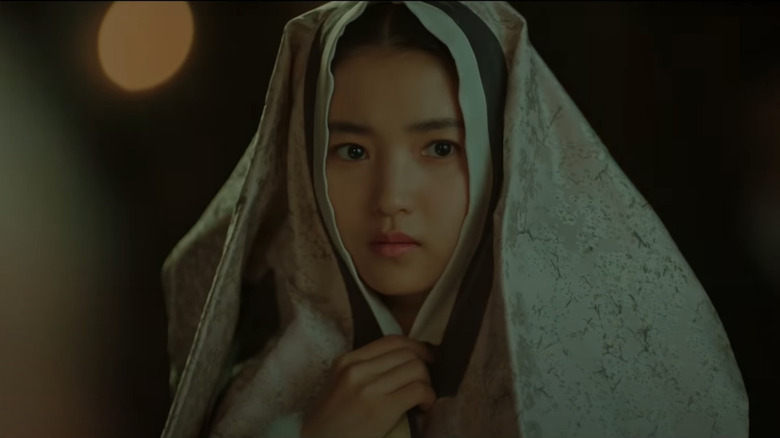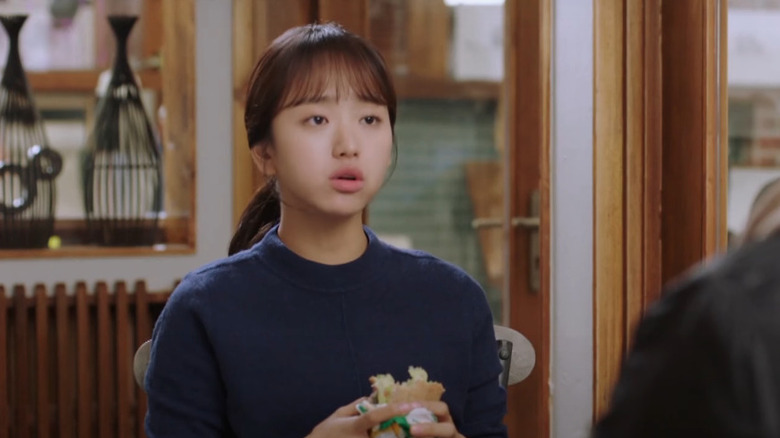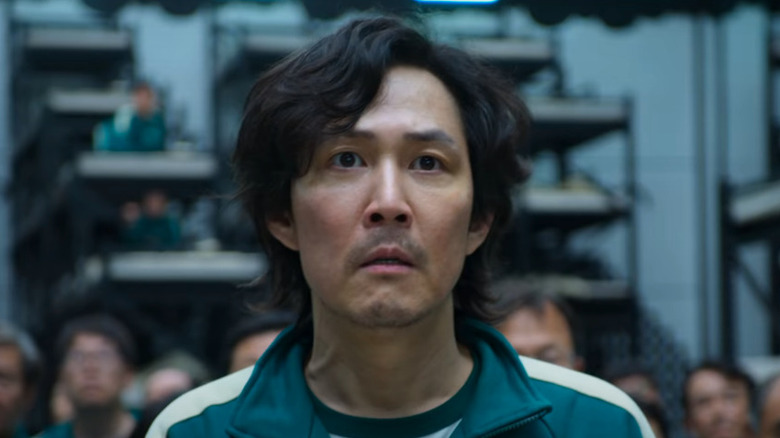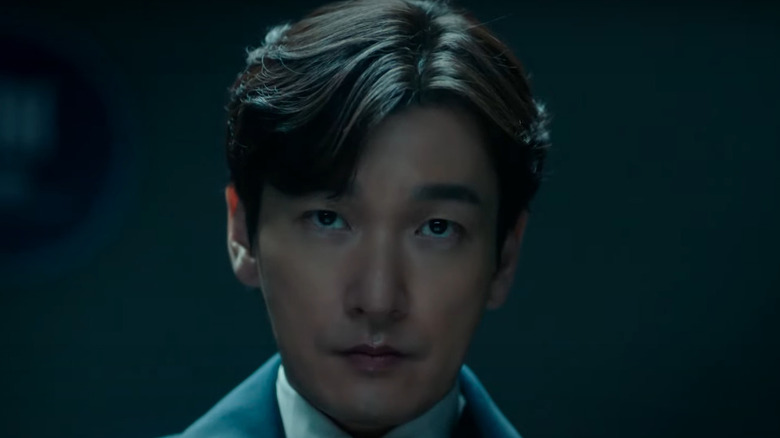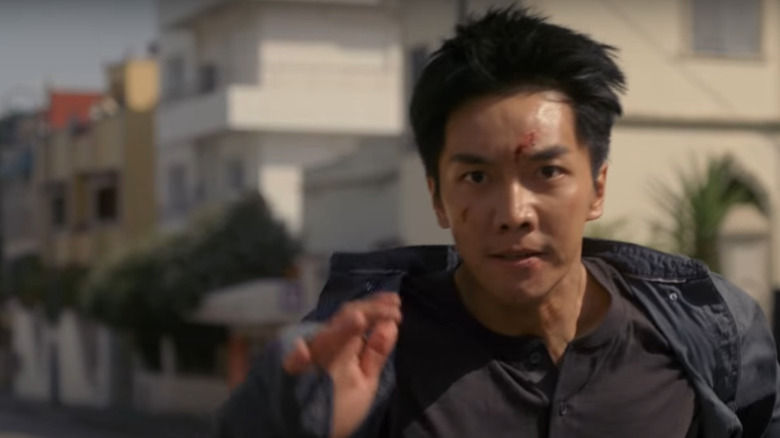The Best K-Dramas You Can Stream On Netflix Right Now
Over the last several years Korean dramas, or K-dramas, have become some of the most popular television programs in the world. Part of this is undoubtedly due to the breakout success of films like the Academy Award-winning "Parasite" and the Fall 2021 streaming sensation "Squid Game." But another factor is that the streaming revolution has created a landscape where these shows have become widely available outside of South Korea for the first time. Thanks to Netflix and other such services, a whole new audience has been introduced to the wild, addictive, highly binge-worthy world of K-dramas, and now they are clamoring for more.
There is no single genre that defines K-drama. They can be light romances, historical adventures, action spectacles, or even supernatural fantasies — all of which are represented on this list. Here are 14 of the best K-dramas currently available on Netflix, listed alphabetically by the show's English-language title.
Because This Is My First Life
Aspiring screenwriter Ji Ho is suddenly homeless after her brother gets his girlfriend pregnant. Se Hee owns his home, but has trouble keeping housemates because of his fastidious nature. He needs a housemate, she needs a house. She's warm, he's cold; can a contract marriage followed by true love be far behind?
"Because This Is My First Life" aired on South Korea's tvN twice a week throughout October and November of 2017, producing 16 episodes.
The romantic dramedy plays with the same fake marriage tropes common as many K-dramas have, but it is elevated by strong, quirky writing and the smoldering chemistry between its two leads, Jung So-Min and Lee Min-Ki. And while it handles the romantic storylines very well, "Because This is My First Life" has more on its mind, tackling workplace harassment, misogyny within marriage, and other social issues facing young Korean women today.
Hi Bye, Mama!
Young wife Yu Ri (Kim Tae-Hee), nine months pregnant, is struck by a car and killed. For five years she exists as a ghost, watching her husband (Lee Kyu-hyung) raise their daughter and eventually remarry, until one day when she is mysteriously resurrected and given 49 days to reclaim her family and once again become human.
"Hi Bye, Mama!" aired in 2020 on South Korean television, running for a total of 16 episodes from February to April of that year.
The main appeal of this series is the lead performance of Kim as the reborn Yu Ri, which steadies the show's sometimes wild swerves in tone. After a relatively zippy first act, the series moves into heavy territory, dealing with grief, loss, and responsibility, while still making time for storylines involving shamans and other spirits. While the middle episodes drag a little, the series sticks its hopeful, heartfelt ending; bring a box of tissues.
Hospital Playlist
This critical and commercial smash comedy follows a close-knit group of Seoul doctors who have been friends since starting medical school in 1999. Now in their early forties, this quintet wrestles with life, love, work, and occasionally each other, all set to a soundtrack of nostalgic '90s and '00s Korean hits.
"Hospital Playlist" recently finished airing its second season, following on the heels of a 2020 debut season that saw the first episode setting the record for the highest premiere rating in its network's history. By the end of its first season, "Hospital Playlist" had become the ninth-highest rated Korean drama in the history oof cable TV.
The series is notable for its tone, which emphasizes the easy chemistry between its five leads, known collectively as "The 99," over "Gray's Anatomy"-style melodrama. Though serious medical situations are a constant, series director Shin Won-ho and writer Lee Woo-jung keep the proceedings light and sensitive. This is a hangout show, through and through.
It's Okay to Not Be Okay
One of the most remarkable things about the K-drama "It's Okay to Not be Okay" is how often it risks its characters coming off as unlikeable, while still being swooningly romantic. The story of antisocial children's book author Moon-young (Seo Yea-ji) and sensitive, withdrawn caretaker Gang Tae (Kim Soo-hyun) plays the standard beats of an opposites-attract plot, but with a rare forthrightness about the challenges of not only living with mental illness, but caring for someone with mental illness as well.
"It's Okay to Not Be Okay" aired a total of 16 episodes between June and August of 2020.
The show was a hit in South Korea, inspiring critical acclaim as well as official censure for its sexual frankness. Its success has extended off-screen, as well; after the series wrapped, five of the children's books written by Moon-young were published in real life.
Itaewon Class
Based on the popular webtoon, "Itaewon Class" follows Sae Ro Yi (Park Seo-jun), a young man fresh out of prison where he served three years for attacking the high school classmate responsible for his father's death. The classmate's father, local restaurant magnate Jang, once employed Sae Ro Yi's father, and now, years later, his former love Soo-ah (Kwon Na-ra) works for Jang's company. With a band of young upstarts, Sae Ro Yi re-opens his family's old restaurant in the Itaewon neighborhood of Seoul with the intent of getting revenge on the Jang family and winning Soo-ah back.
If that sounds like a lot, it's because it is. The show's labyrinthine, Dickensian plotting sometimes sits at odds with the zippy, comedic scenes of Sae Ro Yi and company getting their restaurant up and running. One of his employees, intense young genius Yi-seo (Kim Da-mi), secretly pines for Sae Ro Yi, and it's no shock to discover that she is the better pick than his high school sweetheart.
The King: Eternal Monarch
Romance and palace intrigue cross the boundaries of time and reality itself in 2020's "The King: Eternal Monarch." Young prince Lee-gon of the Kingdom of Corea is rescued from his murderous uncle by a mysterious figure wearing a strange badge. Years later, Lee-gon (Lee Min-ho), now Emperor of Corea, discovers a portal to an alternate dimension and meets Tae-eul (Kim Go-eun), a young police officer from the Republic of Korea, the very same who saved his life 25 years earlier. But how can this be, and what does it have to do with a magical flute said to grant eternal life?
The series earned a fair share of controversy during its run, as viewers objected to the use of Japanese imagery in the design of the alternate universe Kingdom of Corea. Overall, though, audiences at home and abroad connected with the show's eclectic mix of influences, including "Alice in Wonderland," and the courtly romance between Lee-gon and Tae-eul.
Kingdom
A heady, bloody mix of "Game of Thrones" and "The Walking Dead," "Kingdom" wowed audiences when it premiered in 2019. Set in a fictionalized Joseon Dynasty around the turn of the 17th century, Crown Prince Lee Chang (Ju Ji-hoon) reels from the sudden death of his father the king and fends off attempts by the king's wife at usurping his place on the throne. Palace intrigue is the least of his worries, however, as it's revealed that the king is not exactly dead, but infected with a horrible plague that raises the dead by night to feast on the living. Fleeing the palace with his loyal bodyguard, Chang discovers that this plague is quickly spreading across the nation, and there may not be a way to stop it.
Adapted by Kim Eun-hee from her own 2011 web comic, "Kingdom" was an immediate hit. The six-episode first season spawned a second season in 2020, as well as a feature-length spinoff "Ashin of the North" in 2021.
A Korean Odyssey
An exiled immortal falls in love with the woman he needs to eat in order to regain his full power — it's a tale as old as time. Well, a tale as old as the 16th century Chinese novel "Journey to the West," the inspiration behind the 2017 hit series "A Korean Odyssey."
Oh-gong (Lee Seung-gi) was exiled from heaven and seeks to return, but to do so he needs to consume the flesh of Sam-jang, a mythical being who has been reborn as Seon-mi (Oh Yeon-so), a real estate agent who can see ghosts; the only problem is that Oh-gong promised to protect Seon-mi years earlier after she freed him from being held prisoner by fellow immortal Ma-wang (Cha Seung-won).
Throw in a magical umbrella, an enchanted bracelet, a new monster each week, and a pair of smoldering actors in Lee and Oh, and you have the recipe for a perfect binge-watch.
Mr. Sunshine
Choi Yoo-jin, born into slavery, flees to the United States as a boy in 1871. Years later, now known as Eugene, he returns to Korea as a U.S. Marine and very quickly falls for socialite Ae-shin (Kim Tae-ri) who is secretly waging guerilla war against the occupying Japanese army. Can Eugene keep his neutrality when his heart and the forces of history are begging him to take a side?
"Mr. Sunshine" is an intense drama that aired in 2018 on tvN, encompassing such real-life events as the Japan-Korea Treaty of 1905 and the Battles of Ganghwa and Namdaemun. The series produced 24 episodes.
Though some of these period specifics require at least a little background in Korean history, the dynamics between the characters are familiar from any number of wartime romance stories. The series drew controversy in South Korea, both from those who felt that it was too sympathetic to Japan and those who felt it wasn't sympathetic enough.
Rain or Shine (aka Just Between Lovers)
A drama about guilt and recovery, "Rain or Shine," also known by the title "Just Between Lovers," follows three disaster survivors who are brought back into each other's lives by fate. Ten years ago a shopping mall collapsed, killing nearly 50 people. Moon-soo (Won Jin-ah), Gang-doo (Lee Jun-ho), and Joo-won (Lee Ki-woo) were shopping there with their families. All three survived the disaster, but their family members did not.
A decade later, construction has begun on a new building at the site of the collapse. Moon-soo and Joo-won are working on the project as architect and project manager, respectively. Gang-doo, an aspiring soccer player whose injuries from the disaster forced him to give up his dreams, is working as a day laborer. Romance blooms between Gang-doo and Moon-soo, but the series is as much about the trio confronting their survivor's guilt and healing from trauma as it is about romance.
Squid Game
One of the biggest, buzziest TV hits in years, "Squid Game" came out of nowhere in the Fall of 2021 to become Netflix's most popular show of all time. The story of a struggling gambling addict (Lee Jung-jae) who agrees to participate in a deadly children's game competition for the pleasure of a debauched upper class obviously hit a chord with a global audience dealing with nearly two years of global pandemic and an ever-growing wealth gap.
Originally written as a feature film in 2009, writer/creator Hwang Dong-hyuk was inspired by the collapse of financial institutions like Lehman Brothers and spent years trying to get it funded before Netflix gave him the greenlight. Everything from the colorful costume design to simplifying the rules of the games was done in service of making the series as accessible as possible to a global audience, a strategy that clearly paid off. After such a monumental success, the only question remaining is, will there be a sequel? Time will tell.
Start-Up
The world of Korean tech companies is explored in this romantic dramedy. Dal-mi (Bae Suzy), eager to become the next Steve Jobs, seeks out her childhood pen pal, former famous math prodigy Do-san (Nam Joo-hyuk) to help start her own company. The only problem is, Do-san isn't her childhood pen pal. That would be the acerbic Ji-pyung (Kim Seon-ho), who wrote to Dal-mi pretending to be Do-san as a favor to Dal-mi's grandmother.
"Start-Up" aired every Saturday and Sunday or South Korean TV from October to December of 2020. The series produced a total of 16 episodes.
In addition to the requisite love triangle, the series could have filled ten seasons with all its tech industry intrigue, throwing in ransomware attacks, corporate chicanery, and even raw egg attacks. But the real appeal is the strong chemistry between the three leads, particularly Nam and Bae, whose relationship starts on dishonest ground but blossoms into something real.
Stranger
The entire legal system is under investigation in the drama "Stranger." Prosecutor Si-mok (Cho Seung-woo) is investigating a strange murder case with police detective Yeo-jin (Bae Doona), but each twist and turn leads them further into a conspiracy between a corporate conglomerate and Si-mok's own Prosecutor's Office. In its second season, a growing conflict between the Prosecutor's Office and the National Police Agency leads Si-mok and Yeo-jin to break protocol and investigate a cold case.
This series, which ran its first season in 2017 and the second in 2020, boasted serious crossover potential, as it was even featured among the New York Times' Best TV Shows of 2017 list. Each of the two seasons produced 16 episodes.
Beyond the twisty crime plotting, the series boasts diametrically-opposed performances from Cho as the prosecutor whose chilly remove is literally medically induced, and Bae as the hotheaded detective. Like many elevated police procedurals that dare to interrogate the system, "Stranger" was a bigger hit with critics than with audiences.
Vagabond
When his nephew is killed in a plane crash, stuntman Dal-gun (Lee Seung-gi) teams up with an intelligence operative (Bae Suzy) to prove that the plane crash was no accident. The investigation takes them running, jumping, crashing, and shooting across the streets of Morocco as they uncover a conspiracy that goes straight to the top.
When "Vagabond" debuted in 2019, it became one of the most searched dramas in South Korean television. The buzz for the show stayed strong throughout its run, encompassing 16 2-to-3 part episodes.
The series benefits from strong choreography and stunt work, appropriate for a story about a stuntman. The plot is perhaps a little too convoluted for its own good, and those hoping for a finale that ties up all its loose ends will no doubt be disappointed. Still, this is a top-tier action series with strong performances, particularly from Bae, who gets to show a very different side of herself than we saw in "Start-Up."
